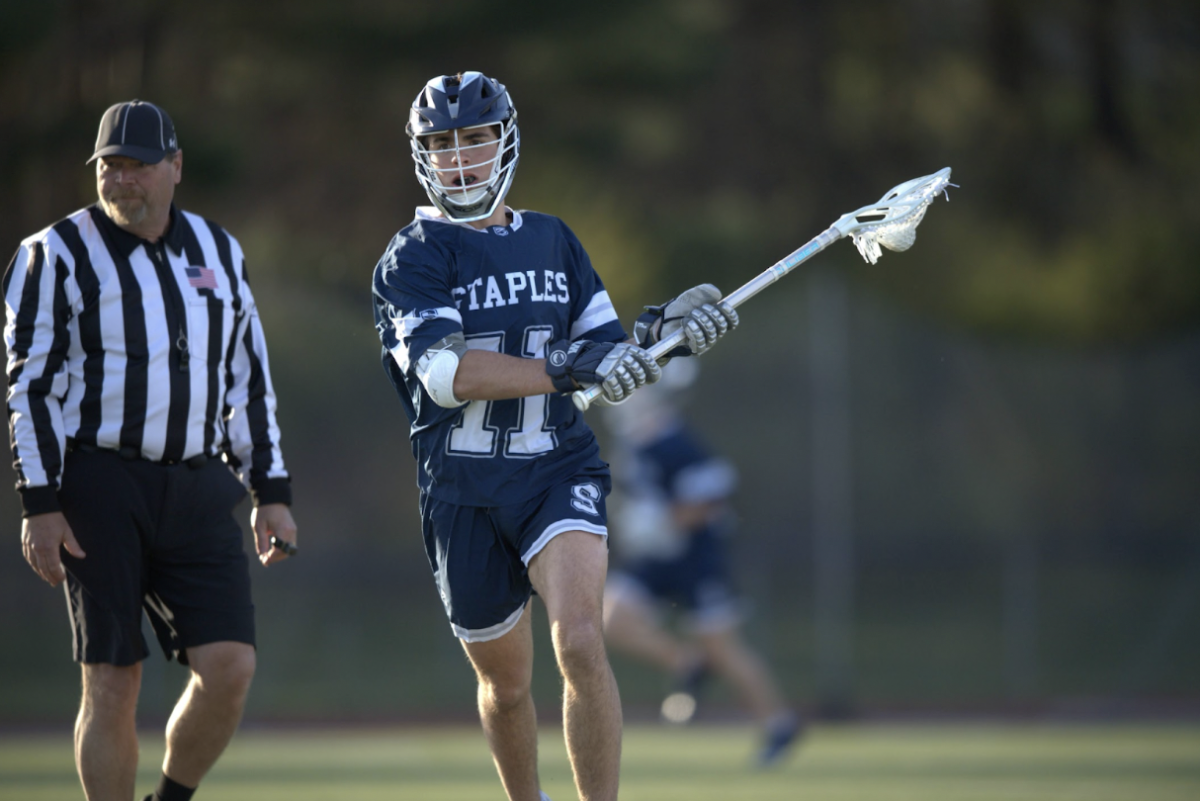In the Staples weight room, muscles strain and faces flush red with effort as boys squat, bench, curl, and lunge their way to strength.
Emphasis on “boys.”
The weight room is a male dominated environment. The football team uses it the most; depending on the season, they might be joined by boys from teams like soccer, lacrosse, and rugby. In comparison, fewer girls take advantage of the facility.
“[The weight room] is open to whatever team wants to use it,” Athletic Director Marty Lisevick said. “It’s only that [football] schedules to get in there the most.”
Kevin Watt ’15 participates in the football program and also trains for rugby and wrestling. He says that the lifting is key to his performance.
“Being stronger than whoever you’re up against can make up for lapses in technique and not being the fastest guy out there,” Watt said.
The question is, why wouldn’t Staples’ female athletes want that same advantage?
Some might argue that weight lifting isn’t particularly beneficial in sports with less emphasis on tackling and physical strength. But professional coaches say that strength training enhances movements like jumping, turning, and accelerating. That’s why Coach Laddie Lawrence has track and field members in the weight room two or three times a week.
“You can’t get faster, you can’t throw further, you can’t jump higher, unless you get stronger,” Lawrence said.
Nicole Ross, P.E. teacher and certified coach at CrossFit Revel, said that some people doubt weight training, arguing that no one does squats on the field. But Ross said that’s not the point.
“When you train your muscles to work at those high intensities, it’s going to help your muscles perform at those high intensities on the field,” Ross said.
Stronger muscles are important for safety as well as performance. Football Coach Marce Petroccio said that his biggest priority in weight training is injury prevention.
“[Players] cannot be on that field unless they are involved in our weight program,” Petroccio said. “Someone would get seriously injured.”
Petroccio’s approach has proven true. Studies show that injuries are less common among athletes who lift weights; strengthened muscles provide greater stability and take pressure off joints.
That kind of preparation is particularly important for girls. Statistics show that, compared to males, female athletes are six times more likely to tear their ACLs—a ligament in the knee. Scientists have identified weak muscles as one factor in this higher risk.
Some girls have recognized the advantages of weightlifting and started incorporating it into their workouts. Lauren Garcia ’15 began weight training at a CrossFit gym in Westport two years ago. “It’s definitely made me stronger,” Garcia said. “My legs can last longer and don’t get as tired.” But few female athletes follow Garcia’s example. Ross says that out of all the teenagers who train at CrossFit Revel, Garcia is the only girl. Ross explained some common fears behind this gender divide.
“Even my friends ask: ‘Why do you do CrossFit? You’re going to get so bulky and manly,’” Ross said. “Women are scared that weight training is going to make them big.”
But Ross said that it takes a certain body type and training program to bulk up. Most athletes aren’t capable of gaining lots of muscle mass, especially if they balance weight lifting with running workouts. That’s how Lawrence’s track team trains, and he said his runners burn too many calories to ever get bulky.
It does take expertise to shape a strength program for a specific sport. Since lifting weights incorrectly is dangerous, some teams might avoid the weight room because they don’t have the necessary guidance.
Teams that can incorporate lifting might find it helps more than just muscles. Lacrosse player Lucas Jackson ’15 said when it comes to weight training as a team, the advantages extend beyond the physical.
“We get stronger and faster, and do so as a team,” Jackson said. “It helps build relationship and strengthen team bonds.”














































